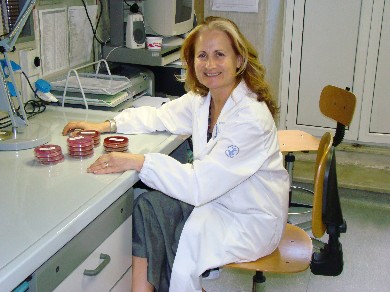Developed skills and lines of research
Ersilia Fiscarelli graduated in Medicine and Surgery from La Sapienza University of Rome in 1980. In 1994 and 2005, she obtained specializations in Laboratory Medicine and Infectious Diseases. She is currently the head of the Cystic Fibrosis Microbiology Laboratory at the Bambino Gesù Children’s Hospital Research Center in Rome. She has worked on numerous research projects in microbiology related to cystic fibrosis, producing over 50 international scientific publications and contributing chapters to several books.
Projects financed by FFC Ricerca as a partner
FFC#16/2021
Linking elexacaftor/tezacaftor/ivacaftor to infections in cystic fibrosis lung disease
FFC#26/2018
Aspergillus pulmonary disease in cystic fibrosis (CF) patients: multicentre perspective observational study based on new diagnostic tests to evaluate the prognostic value on the CF disease
FFC#14/2015
Investigating the airway microbiome in cystic fibrosis patients with a severe decline in lung function: an opportunity for a personalized microbiome-based therapy
FFC#10/2014
Investigating the airway microbiome in cystic fibrosis patients with a severe decline in lung function: an opportunity for a personalized microbiomebased therapy
FFC#10/2013
Anti-virulence therapy against Pseudomonas aeruginosa: identification of antibiofilm drugs and development of inhalable Niclosamide and Flucytosine formulations
FFC#8/2012
Investigation of cystic fibrosis airway microbiome in patients showing a severe decline in lung function and not responding to conventional antimicrobial therapy
FFC#12/2009
Novel strategies for respiratory infection therapy in CF. Use of natural and designed antibacterial peptides
FFC#7/2007
Stenotrophomonas maltophilia, a multidrug resistant emergent pathogen associated to cystic fibrosis: a post-genomic approach to identify new immunological and therapeutical targets

